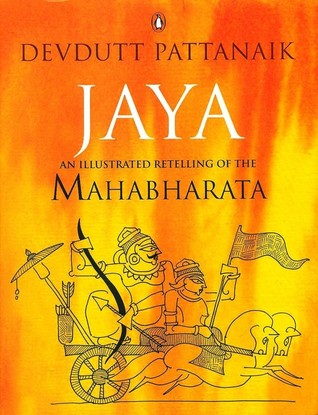📚 Jaya - Devdutt Pattanaik (2010)
An amalgamation of the various versions of the Mahabharat, consolidated by one Mr. Pattanaik. This version encourages one to achieve inner peace in their life, but portrays how people actually end up doing the completely opposite in their life.

Whata isa thisa? A.K.A. the shwa syncope
Most stories that I knew were either narrated or were in देवनागरी. So it didn’t bother me as much when people wrote words like ‘Mahabharata’ but pronounced them as ‘Mahabharat’. But given that this book is in English, there was an annoying dissonance between what I was reading and what I was used to pronouncing in my head.
It seemed to me that the trailing ‘a’ in ‘Mahabhahrata’ was an extraneous addition as a result of some early translations. A quick google search reveals this insightful Quora answer which in turn points to a Wikipedia page on shwa deletion in Indo-Aryan languages. Having skimmed through the idea of selectively removing the trailing shwa, the discrepancy starts making much more sense. Though I am now tempted to annoy other people by pronouncing everything like one would in Sanskrit.
Measuring shit
My grandmother always mentioned that god keeps track of whatever you do and had two columns in his book of accounts; one for good deeds — Punya and the other for bad ones — Paapa. And once you died he would balance out the two and see which one had a deficit. Once you had suffered or enjoyed and balanced out the two, you’d be reborn again.
I’d always asked how to quantify the two; what is the measuring unit? But no answer was coming forth.
Can one come up with a model that keeps track of these up to a reasonable approximation. The causality presented is as follows:
Adharma ∝ Paapa ∝ Suffering
Vaikuntha
An interesting idea presented in the book is that of Vaikuntha, Vishnu’s abode. It is a place where one is free from all desires as opposed to Swarga, where all desires are indulged. In the end Yudhishtira is the one who triumphs over his inner beast and ascends to Vaikuntha, while his brothers and wife suffer in hell.
But that’s the whole irony of Vaikuntha, the moment you renounce everything and achieve complete inner peace, Vaikuntha itself should stop mattering. Technically, Vaikuntha doesn’t even need to exist because the people who are worthy of going there by definition don’t care where they are.
I want to go to Vaikuntha.
— one who is definitely not going to Vaikuntha
For the rest of the world which doesn’t get this logic, there is the proverbial ‘carrot on a stick’ of Swarga where you can spend your accumulated Punya as currency.
Note how Yudhishtira is the only one who isn’t cursed at all in the story. While he does gamble away his wealth and his family, all this is still within the realm of Dharma. This conveniently keeps his Paapa at an all time low, making him ideally suited to enter Vaikuntha.
In this way the Mahabharata feels like just another way of getting people to do generally good things and not be bad people.
